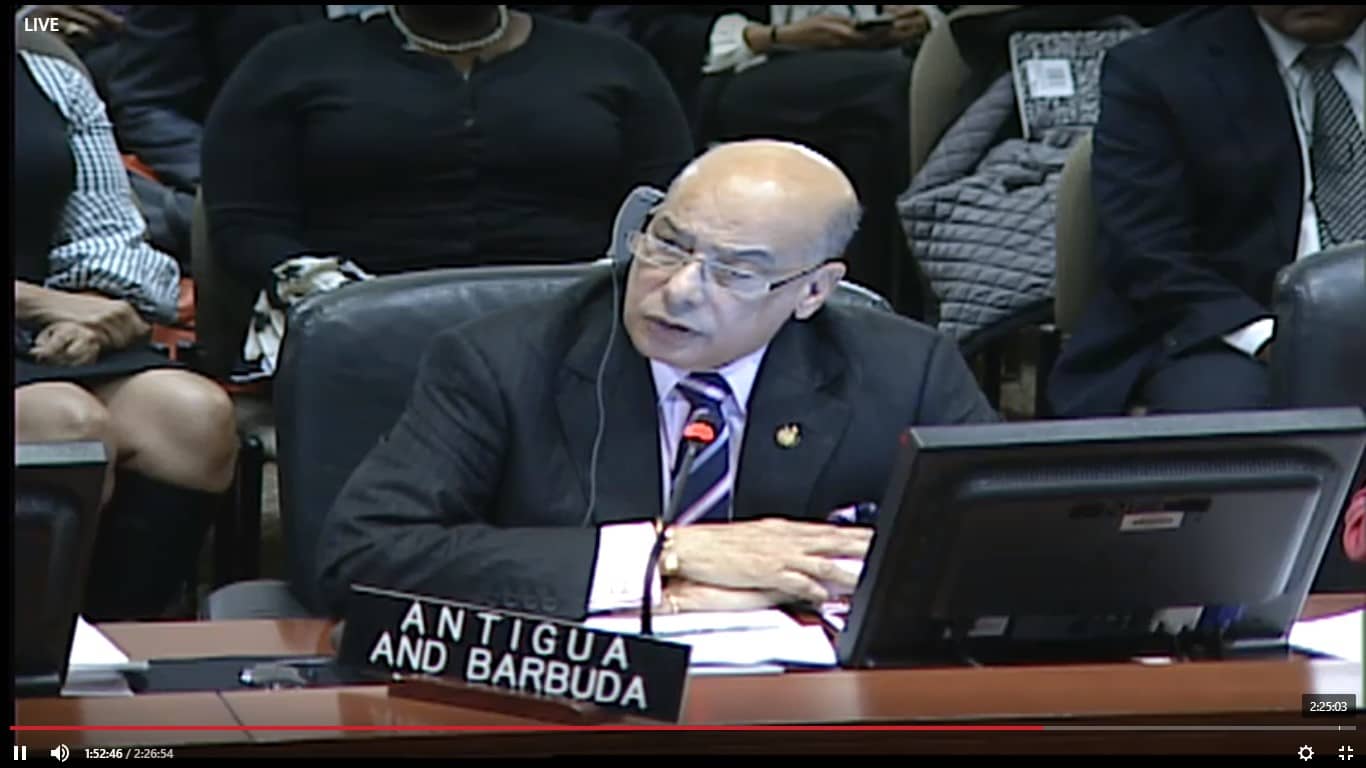
By Sir Ronald Sanders
(The writer is Ambassador of Antigua and Barbuda to the United States and the Organisation of American States. He is also a Senior Fellow at the Institute of Commonwealth Studies at the University of London and at Massey College in the University of Toronto. The views expressed are entirely his own)
The law is the law and it is binding on all who dwell or visit within its jurisdiction. The law is particularly binding on those who make the law. As I observed in a previous commentary, “Law makers should not be law breakers”.
This issue is raised again in the context of persons who hold dual citizenships while seeking election – and, in some cases getting elected – to the legislative bodies of countries. Those who either seek or achieve such election violate the law of the land in countries of the Caribbean Community (CARICOM), particularly when they also hold Cabinet positions, formulating national policy.
This matter has arisen time and again in Caribbean countries; among them: Antigua and Barbuda, Belize, Dominica, Jamaica, St Kitts Nevis and St Vincent and the Grenadines and Trinidad and Tobago where dual nationals have sought election, or have been elected, to the legislature, leading to political storms that caused them either to resign from office or withdraw as candidates for election.
The reason for the disqualification of a dual national from eligibility to legislative bodies and Government cabinets is simple and straightforward. As University of the West Indies Law lecturer and columnist, Jefferson Cumberbatch, observed: it is “a secular version of the axiom that no man can serve two masters”.
To become a citizen of a country other than the one in which a person is born, allegiance must be sworn to that country. But, Caribbean constitutions forbid such double allegiance in the context of election to the House of Representatives. In almost uniform language, they state: “No person shall be qualified to be elected as a member of the House of Representatives who by virtue of his own act, under any acknowledgement of allegiance, obedience or adherence to a foreign Power or State”.
The words “who by virtue of his (also her) own act” are important. In two celebrated instances involving Prime Ministers, Lester Bird of Antigua and Barbuda and Edward Seaga of Jamaica, held the highest elective office in their countries even though they were born in the United States and were automatically citizens of that country. However, they were not denied election to their legislatures or to the Office of Prime Minister, because they did not choose by their own volition to be born in the U.S., thereby becoming U.S. citizens. To their credit, they both rescinded their U.S. citizenships anyway.

There is a third, less famous case of David Thompson of Barbados who was a member of parliament, opposition leader and, briefly before his untimely death, Prime Minister of Barbados. Thompson was born in the United Kingdom, again through no fault of his own. Therefore, in standing for election, he broke no law.
Retaining foreign citizenship, while serving as a lawmaker and government policy maker, poses further problems beyond the substantial issue of “to whom do you owe allegiance?”. These include: payment of taxes to the country of second citizenship on income earned world-wide, that is applicable by Canada and the U.S., and obligations to serve in the military or to be conscripted. These obligations open the holder of a parliamentary or Cabinet post to influences, maybe even coercion, that could be harmful to the best interests of the country in which he or she is serving.
There is the further issue of what has been called “the no escape clause”. A 2008 study by the Caribbean Policy Initiative put that argument as follows: “An individual who has pledged allegiance to a foreign power may offer less than full commitment to either country. The risk is that, at the margins, the individual in question might make trade-offs that an individual who holds only one citizenship – and thus has no “escape clause” – would not have the option of doing. In the event of a crisis, he or she might leave the country. In the case of a conflict between the two countries of which he or she is a citizen, his or her loyalty to the country in which he/she is a law or policy maker might be compromised”.
There was at least one law-maker in the Guyana National Assembly who was a dual citizen – the now notorious Charandass Persaud – whose vote led to the success of a no-confidence motion and the political crisis in which Guyana is presently placed. Mr. Persaud had an “escape clause”, namely his citizenship of Canada that he immediately exercised by returning there in residence.
Despite these cogent facts and the law itself, many dual nationals appear to remain in the Guyana parliament on all sides of the political divide. The law, therefore, takes second place to political expediency – at least, for now.
But, this relegation of the law will have to be corrected before the next general election which, after the current Court appeals are concluded, will have to be held. At that point, the list of names for submission as parliamentarians must be disinfected of all dual nationals. With the razor-thin majorities by which governments have been elected (and deposed) in recent times, it would take a successful challenge of only one dual-national to again topple a government and toss the country into constitutional and electoral confusion.
Throughout the Caribbean, those, who defend the instances of dual nationals knowingly seeking election despite the legal disqualification, argue that Caribbean countries are too small to disregard the talent and knowledge of their nationals who, for one reason or another, obtain a second citizenship.
In part, that argument has validity. Some of the Caribbean’s most experienced and informed nationals have gained their experience and knowledge abroad along with their second citizenship. However, they are not prohibited from returning to their native countries and contributing their acquired capabilities. The prohibition only applies to those who seek elected office with the responsibility to make national policy decisions. The latter, as has been pointed out earlier in this commentary, makes the official who bears allegiance to a second country, susceptible to influences that could be inimical to the interests of the nation he or she is elected to serve.
Dual nationals, who still hold parliamentary seats and government Cabinet posts, do neither their party nor their country any good by retaining their second citizenships and sworn allegiance to the countries concerned. The same applies to dual nationals who might seek elected office in the future.
If these persons wish to hold elected office, they should rescind their citizenships of other countries and serve the necessary period of residence. There is no better demonstration of loyalty, fidelity and commitment to a nation than to shed allegiance to any other.
Responses and previous commentaries: www.sirronaldsanders.com
Advertise with the mоѕt vіѕіtеd nеwѕ ѕіtе іn Antigua!
We offer fully customizable and flexible digital marketing packages.
Contact us at [email protected]
















Does Dr. Denzil Douglas being the holder of a Dominica diplomatic passport, considered to be a holder of “dual citizenship”?
Sadly, inspite of this same very said law that prevents many persons who holds dual citizenship from seeking high office in their countries of birth. many such situations are present even today. A proper search would reveal that we have members of the lower house in Antigua who are themselves citizens of a foreign country. The very same is true in many Caribbean Community countries and it happens because no one has challenged those members who choses to act in contravention to the same laws that they crested. Sad indeed.
Isn’t that why Mac Emmanuel rani n the first place? Because he was just a “filler” for the UPP – knowing very well that he was NOT going to win (and if by some miracle he had won, he would not have been willing to renounce his U.S. citizenship)
Ambassadors should not be dual citizens either. You never know in whose interest they work. Since Saunders has been ambassador to the US he has been lobbying for Guyana and Venezuela on our dime. The WTO settlement is still unpaid, we didn’t get US visa renewal waivers like the rest of the OECS. He finds time to write articles for newspapers all over the Caribbean though, is this what we pay him for?
Does this include Ambassadors and other representing our Government in diplomatic service???
Does the author think we should kick out all the ambassadors and diplomatic representatives who hold dual citizenship?
Comments are closed.